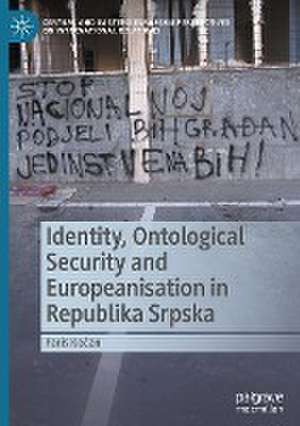Identity, Ontological Security and Europeanisation in Republika Srpska: Central and Eastern European Perspectives on International Relations
Autor Faris Kočanen Limba Engleză Hardback – 16 noi 2023
Preț: 697.32 lei
Preț vechi: 820.38 lei
-15% Nou
Puncte Express: 1046
Preț estimativ în valută:
133.45€ • 144.91$ • 112.10£
133.45€ • 144.91$ • 112.10£
Carte tipărită la comandă
Livrare economică 22 aprilie-06 mai
Preluare comenzi: 021 569.72.76
Specificații
ISBN-13: 9783031461682
ISBN-10: 3031461681
Pagini: 220
Ilustrații: XI, 220 p. 21 illus.
Dimensiuni: 148 x 210 mm
Greutate: 0.43 kg
Ediția:1st ed. 2023
Editura: Springer Nature Switzerland
Colecția Palgrave Macmillan
Seria Central and Eastern European Perspectives on International Relations
Locul publicării:Cham, Switzerland
ISBN-10: 3031461681
Pagini: 220
Ilustrații: XI, 220 p. 21 illus.
Dimensiuni: 148 x 210 mm
Greutate: 0.43 kg
Ediția:1st ed. 2023
Editura: Springer Nature Switzerland
Colecția Palgrave Macmillan
Seria Central and Eastern European Perspectives on International Relations
Locul publicării:Cham, Switzerland
Cuprins
1. Introduction.- 2. Methodology.- 3. Theoretical Framework.- 4. Imagining the Bosnian Serb Ethnic Identity: A Historical Overview.- 5. Discourse Analysis of Securitisation Acts of the Political Elite in Republika Srpska.- 6. Perceptions of the Voters in Republika Srpska on the Internat and External Other.- 7. Conclusions.
Notă biografică
Faris Kočan is Assistant Professor at University of Ljubljana, Faculty of Social Sciences. His research is focused on the Europeanisation of the Western Balkans and the role of the European integration in addressing the troubled past of post-Yugoslav space. He has published, among others, in the Nationalities Papers, Ethnopolitics, Southeast European and Black Sea Studies, and contributed chapters to monographs published in international publishing houses (Peter Lang, Ibidem). He has been working on many research projects, including those funded by Horizon 2020, JM/Erasmus+ and Slovenian Research Council.
Textul de pe ultima copertă
This book discusses the impact of the process of accession to the European Union (EU) – i.e. Europeanisation – on the formulation of the ethnic identity of Bosnian Serbs and the political identity of Republika Srpska (RS) in Bosnia and Herzegovina (BiH). The centrepiece of the book is an examination of how it is possible that the expected effect of Europeanisation on ethnic identities in a post-conflict environment – a transformation of ethnic identities through desecuritisation – does not materialise in the case of BiH and the RS. The book starts from the assumption that the political elite in the RS uses Europeanisation as a context for the securitization of two sources of threats – the internal and external Other. This prevents the transformation of ethnic identities in BiH, and as a result also the desecuritisation of antagonisms among the ethnic groups of BiH. The results show that any attempt at a more active engagement by the EU and international community was interpreted by the RS political elite as Bosniak agenda aimed against the RS. In this respect, the book demonstrates that BiH’s EU accession process or a clearer EU perspective alone in scrutinized critical junctures did not outweigh the potential costs for the RS political elite if reforms aimed at creating a more functional BiH were to succeed. In all three analysed critical junctures, the political elite in RS presented motions for a more functional BiH as attempts to centralise the country and framed them as the beginning of the end for the RS as a political entity.Faris Kočan is Assistant Professor at University of Ljubljana, Faculty of Social Sciences. His research is focused on the Europeanisation of the Western Balkans and the role of the European integration in addressing the troubled past of post-Yugoslav space. He has published, among others, in the Nationalities Papers, Ethnopolitics, Southeast European and Black Sea Studies, and contributed chapters to monographs published in international publishing houses (Peter Lang, Ibidem). He has been working on many research projects, including those funded by Horizon 2020, JM/Erasmus+ and Slovenian Research Council.
Caracteristici
Discusses impact of accession to EU on the ethnic identity of Bosnian Serbs Reveals how the political elite in Republika Srpska (RS) maintains ontological security of the RS as a political entity Shows how the context of Europeanisation generates a sense of ontological insecurity in RS











